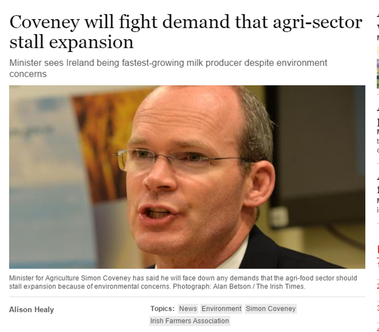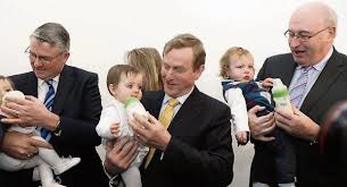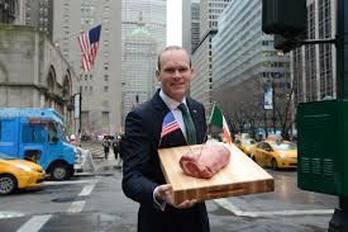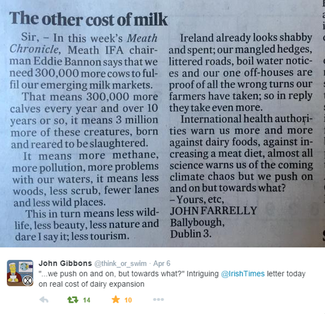
Ireland will face heavy fines by the EU for not meeting our emission reduction obligations by 2020. Minister Coveney seems content to let the Irish tax payer foot that bill of between 50-300 million euro and deal with the environmental consequences of agricultural intensification as long as his own interests are protected. This week, it’s time to address Coveney’s special interests directly.
Daring to mention the sacred cow
Agriculture, as the largest emitter of GHGs in Ireland (32% of total emissions last year), is one sector that requires urgent examination as to how it can help solve the problem of climate change. Lots of research has already been done to prove that Irish agriculture can cost-effectively reduce GHG emissions, so this post will not reiterate all the options available for the sector to play its part in solving the climate problem. Instead, I want to look at Coveney’s argument to exempt agriculture from reducing GHG emissions and demonstrate why his values don’t hold up environmentally or economically.
Just how important is agriculture to our economy?
 irishexaminer.ie
irishexaminer.ie The largest share (30%) of our agri-food exports is in dairy products and ingredients, followed by beef (21%). However, family farm incomes in these areas do not necessarily reflect the global view. Average farm incomes are falling sharply in 2015 in all areas of farming. In 2014, more than 100% of cattle and sheep farm income was based on direct payment subsidies, and with the abolishment of milk quotas this month, the number of dairy farmers in Ireland is expected to continue to plummet losing a further 3,000 farmers as farms consolidate to maintain profits.
If farmers aren’t seeing the profits, where is the money from our dairy and beef exports going? Large retailers don’t have to publish details of their accounts, but the suspicion is that middle men and retailers are profiting at the expense of farmers and consumers. Even in the more profitable dairy sector, farmers say they see only a shocking 2 cents profit per litre of milk production and the end of milk quotas will further pressurise the fresh milk market. A majority of the milk produced in Ireland is owned by a handful of wholesale producers who furnish 15% of the world’s babies with infant formula (aiming for 60% in the next 5 years). Ironically, the world famously boycotted Nestle for supplying African mothers with infant formula in the 1970s, but we turn a blind eye as our own companies employ similar tactics with Chinese mothers today subsidised heavily by our government.
Where is Irish agriculture headed?
Meanwhile, Minister Coveney charges ahead with his Food Harvest 2020 ambitions for intensification of the dairy and beef sectors and tries to convince us that this can be done with only “slightly negative” or no environmental impacts. In reality, it’s hard to see how Coveney’s own prediction of an additional 300,000 cows in Ireland’s national herd by 2020 could result in anything but more greenhouse gas emissions and further degradation to water resources. Even Teagasc has recently come out stating that expansion in the dairy sector beyond 2020 will inevitably lead to an increase absolute GHG emissions from agriculture. Minister Coveney is sacrificing our reputation as a clean, green food producer for short-term, short-sighted economic gains. When he’s done, we’ll still be left with underpaid farmers and we’ll have the added dimension of a landscape ruined by the intensification of agriculture but at least the babies in China will be well-weaned.
Where should Irish agriculture be headed?
 Agriland.ie
Agriland.ie It’s true that we should be thinking about the need to increase agricultural production to cope with future EU climatic changes. However, when you look at how we’re increasing food production in Ireland right now, it has nothing to do with European food sovereignty. We’re completely focused on supplying infant formula to China and peddling subsidised, unprofitable beef abroad. If we want to feed Europe (or even ourselves), we should be focused on producing the type of food products that are or will be needed in Europe and Ireland. Infant formula is clearly not one of those products, and beef is just not resource efficient or profitable enough to justify its continued production in Ireland.
It makes sense for Ireland to be the dairy producers of Europe. We’re good at dairy production and our climate favours it, but we need to balance an increase in dairy production with the long-term environmental impacts that this production can have. Cows produce significant environmental damage in the form of greenhouse gas emissions and damage to water quality from their wastes. A short term increase in agricultural production and profits is no good to us if we destroy our land and water in the process and have to pay fines to the EU for failing to meet environmental obligations on top of it all.
The logical approach to increase dairy production and the number of dairy cows is to simultaneously reduce our unprofitable suckler herd for beef. There are whispers that this is the obvious answer to reducing our greenhouse gas emissions and preserving water quality while maintaining the agricultural production that we’re good at, but no one has challenged Minister Coveney on this issue. Furthermore, while a dairy cow gives us milk almost year round and at least a calf a year, a suckler cow only gives us one calf a year but still releases the same amount of methane as a dairy cow without the milk production. It terms of value for money, I’d put mine on the dairy cow over beef.
Bottom line
| If Coveney wants us to buy into his claims that agriculture will save our economy, he needs to stop promoting an unviable business in the form of beef and reduce the beef herd in line with his expansion of the dairy herd. If he wants to use food security as a justification for agricultural expansion, he needs to stop trying to wean Chinese babies off their mothers’ milk and start trying to feed Ireland and Europe instead. And if Minister Coveney wants us to believe that he gives a damn about this country, he’ll stop putting the short-term financial gains of the mighty few above the long-term well being of our landscape, our environment, our public health, and our taxes. Bottom line: Simon Coveney needs to stop pandering to big agricultural interests at the expense of the rest of Irish society. |


 RSS Feed
RSS Feed